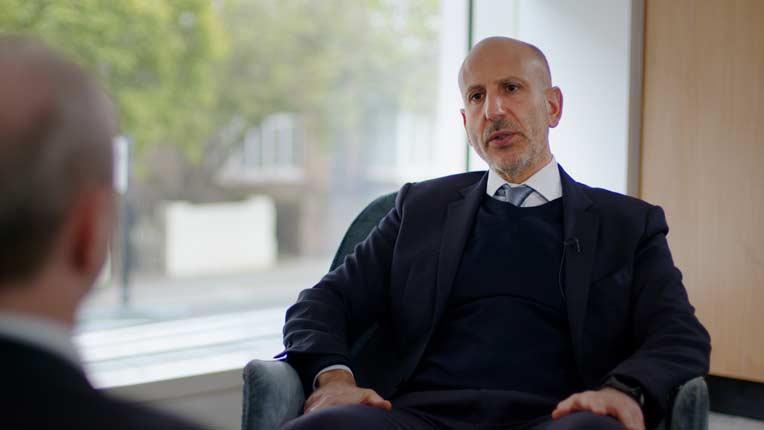Ollie Smith: Emily, thanks so much for joining us. I'd like to start with anger if I may, because you went to the US and in the process provoked the ire of one Marjorie Taylor Greene. So, could you just describe for me what you think that incident said about political discourse in the US and more broadly, in election year?
Emily Maitlis: I think anger is often used as an election tool. We've seen it used very cleverly by Donald Trump and by the MAGA lot to suggest that they should be angry. There is a passion to what they should be feeling. And I think it probably helps to energise a crowd. And so, the weirdest thing about that encounter was – I think I was terribly British and sort of terribly…
OS: I think you thanked her.
EM: I think I did thank her. I did thank her, which is just the sort of British response to everything, isn't it? You know, a cup of tea. But I think for her supporters, it worked really well for her. She was delighted when it went viral because it seemed to her to demonstrate how she is seen by the people who love her as socking it to the Brit or whatever it is. And so, it was a kind of strange one. I didn't feel particularly offended by it because I realised it was part of her performance.
OS: So, you weren't expecting it?
EM: I don't think you're ever quite expecting to be told that by a politician. I don't think it would happen in this country. But I also – she has got a bit of form. She uses quite fruity language. So, for me, it was the end of the night. It was literally the last interview we did of the night. And yeah, it was the one that everyone remembers.
OS: Sure. Sicking with the US election campaign, then. I mean, in your speech today to Morningstar Investment Conference UK, you talked about some of the issues that might sway the vote this year. If I think back to 2016, it was all about kind of "crooked Hillary" and the emails. What the defining talking points of US election 2024?
EM: I think if you're a Republican, you want to keep everyone talking, thinking about immigration, about where it's going wrong, about whether the border is secure or insecure, porous. And I think if you are a Democrat, you want to attach everything that's happening on abortion legislation and women's rights, female reproductive rights to Donald Trump's changes to the Supreme Court. And in a way, that's how the elections are going to be fought. You will just see Republicans talking about immigration and never mentioning abortion. And you will just see the Democrats trying to talk about women's health and not wanting to get too dragged into the immigration issue. There is a chance that both sides aren't really talking to each other at all.
OS: Sure. You mentioned the Democrats. What's the current health of the Democratic Party? I know people talk about Joe Biden's health, but what's the current health of the Democratic Party overall?
EM: I think Hakeem Jeffries, who is the majority leader of the Senate, has produced what looks like a future generation template, wants to move away from some of the older Democrats. But I think these issues surrounding Joe Biden's age are not really going away. And I think the Democrats are now entering a phase of saying, look, we've got amazing legislative successes to talk about. We've got the Inflation Reduction Act. We've got the rescue packages. We've got the drop in inflation. We want to be talking about this. How do we move past the age thing to talk about the actual successes that we have convinced people of in terms of legislation? Because some of those deals, like indeed the aid package they just got through, can be waved up and held up as an example of things that Biden's presidency has got done. I guess it's just changing the narrative for them to stop people looking at what they think is a man who is too old.
OS: You portrayed Trump now as being somewhat gloomier and somewhat more obsessive, but I wondered whether, like Joe Biden, he is not exactly drinking from the fountain of youth himself. I recall there was the doctor's note incident in 2016 before the 2016 election, where he attempted to prove himself as this the fittest man for presidential office ever, but that kind of lie is always going to catch up with someone as they age, right?
EM: Well, the one I can't get out of my mind is that – do you remember when he did the memory test?
OS: Yes.
EM: And it became this meme, and he kept saying, "person, man, TV, camera, woman," and he was just repeating back the order of random objects that he'd been asked to remember and just the idea that somebody would have to sort of prove themselves so hard. And it became this meme because it sounded ridiculous, right? We were in a ridiculous place where everyone was kind of saying, I'm the fittest man, I've got the most perfect memory, I made the most perfect phone call. I think for both of them, it clearly is an issue. We're talking about one man in his late 70s and one man in his early 80s.
I think we'd be crazy to assume that there's a massive age gap between the two of them. I think Donald Trump has always played to this idea of machismo, actually, strength. And that's not Biden's style. Biden is articulate and he is fiendishly good on the actual details of legislation and policy, whereas a lot of Trump stuff actually unravels if you try and ask him about the details too closely. But I think it's about perception as much as anything. Most people in America, just like here, do not give politics their full attention until the final run up to the election. So, a lot of this stuff is about perception.
OS: Sure. Just finally, I think it was mentioned on stage, lots of media outlets and commentators were wrong-footed by Trump 1.0. Do you think there's any complacency left?
EM: No, I think the opposite, actually. I think people are – a lot of people are now telling me that Trump is definitely a shoe-in. Oh, he's definitely going to do it again. He's definitely going to win, isn't he?
OS: Who are those people?
EM: Well, I think they're people, to your point, who felt that they were wrong-footed, who felt that they were surprised and now don't want to be seen to be looking naive if the poll is close. I think the truth is the swing states at the moment do favour Trump. I think the gap can be closed by Biden. To my first point, April, May, which is when we're recording this is not November and anything could happen. And the one thing that all political commentators talk about is the October surprise. And the October surprise is the thing that no one sees coming. But of course, it's called the October surprise. But it can rewrite everything.
And so, we've got the debates to come. We've got the choice of vice president, the VP pick for Trump to come. We've got whatever happens on a global scale, whether it's Ukraine, Russia, Israel, Gaza, we don't know. All these issues can redefine what happens come the first week of November. So, I think it's all to play for.
OS: Do you think you'll be seeing Marjorie Taylor Greene again?
EM: I hope so.
OS: Emily Maitlis, thank you so much for talking to us.
EM: Thank you. Thanks, Ollie.





























